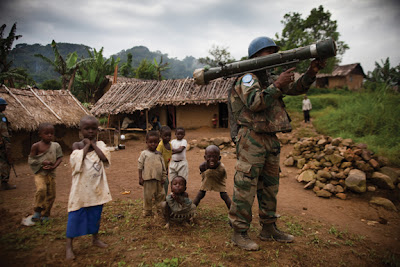It
hurts me to read about the ongoing conflicts that transpire in
Democratic Republic of Congo. To date Democratic Republic of Congo has
been noted as being the place of the deadest conflict in world history
behind World War II. Since 1998 a reported 5.4 million people have died
in wars, conflicts, and disease and starvation. Although the war is
technically over thousands continue to die daily due to the control of
Congo’s vast mineral wealth. The media never talks about the Conflicts
in Congo, this may be because of a few reason that myself and others
have researched and came up with.
· Reason #1-After
record growth in the 1950s, a series of internationally orchestrated
local conflicts have kept Africa right where the US can manage it
without becoming threatened (Walters, 2008). Moreover
Between 1960 and 1974, there were nine coups and seven major conflicts
in Africa, including Ghana, Uganda, Angola, and the Congo. According to Apocalypse Africa,
all the coups between 1956 and today have involved the US in some
capacity. The US has been known to supply weapons or money to both sides
of the conflicts, in order to foster instability and dependence on
American wealth (Walters, 2008).
Supposedly, the African bureau of the Department of State looked the
other way as Uganda’s notorious despot Idi Amin led the murder of
300,000 of his citizens. John Stockwell, a former CIA chief and member
of the Angola Task Force, explains “The CIA maintains prepackaged stocks
of foreign-made weapons for instant shipment anywhere in the world.”
With those reserves, our government can influence conflicts without
obvious culpability (Walters, 2008)
· Reason 2
Congo currently holds the world’s largest reserves of Colton and
cassiterite. In the coltan mining industry, Children are forced to work
for pennies a day to produce Colton, a mineral used to make cell phones,
video games, and laptops. DR Congo currently holds 80% of the world’s
reserve of Coltan that sells over $400.00 per pound. Congo mineral war
has led to the death of over 4 million people. Congo
holds 80% of the worlds’ Coltan reserves, historically, the U.S.
government identified sources of materials in Third World countries, and
then encouraged U.S. corporations to invest in and facilitate their
production. Dating back to the mid-1960s, the U.S. government literally
installed the dictatorship of Mobutu Sese Seko, which gave U.S.
corporations access to the Congo’s minerals for more than 30 years
· Reason 3-
In 1998, U.S. military-trained leaders of Rwanda and Uganda invaded the
mineral-rich areas of the Congo. The invaders installed illegal
colonial-style governments which continue to receive millions of dollars
in arms and military training from the United States. Our government
and a $5 million Citibank loan keeps the rebel presence in the Congo.
Their control of mineral rich areas allows western corporations, such as
American Mineral Fields, to illegally mine. Rwandan and Ugandan control
over this area is beneficial for both governments and for the
corporations that continue to exploit the Congo’s natural wealth (Ray).
· Reason 4- The
UN had a strong presence in DR Congo since the beginning of the civil
wars that claimed the lives of over four million people. Unfortunately
their intensions were not always the best. In 2004 a major scandal book
out involving UN peacekeepers rapping young children and women in Congo.
In 2005 a classified United Nations report prompted Secretary General
Kofi Annan to admit that U.N. peacekeepers and staff have sexually
abused or exploited war refugees in the Democratic Republic of Congo.
The worst of the 150 or so allegations of misconduct--some of them
captured on videotape--include pedophilia, rape, and prostitution. U.N.
report found "widespread" evidence of sexual abuse of West African
refugees (Loconte, 2005). Allegations
of sexual abuse or misconduct by U.N. staff stretch back at least a
decade, to operations in Kosovo, Sierra Leone, Liberia, and Guinea. A
2001 report, released by the U.N. High Commissioner for Refugees (UNHCR)
and Save the Children, found that sexual violence against refugees in
West Africa was endemic (Loconte, 2005). Most
of the sexual abuse and exploitation, says the report, involves trading
sex for money, food or jobs. However, some victims say they were raped,
but later given food or money to make the incident appear to have been
consensual – "rape disguised as prostitution” (Loconte, 2005).
Ray, E. (n.d.). American Companies Exploit the Congo.
Retrieved 04 16, 2011, from Project Censored:
http://www.projectcensored.org/top-stories/articles/19-american-companies-exploit-the-congo/










































